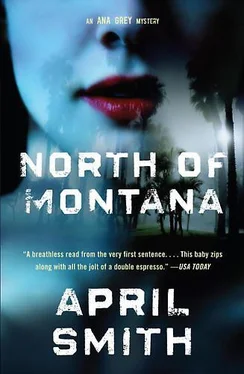Now I am forced to question it all as I hold a piece of paper torn from a small notebook upon which is written the name of a white woman who allegedly fired a cousin of mine who was Hispanic. The name is Claire Eberhardt. The address is on Twentieth Street, eight blocks from Poppy’s old house, north of Montana, where I spent the first five years of my life, in the city of Santa Monica — a former beach town of funky bungalows and windswept Pacific views that has now become an overbuilt upscale enclave on the westernmost edge of the Los Angeles sprawl.
Even pulling out of the parking lot I hesitate, then make a decisive turn away from Century City and the sweet new humidifier, west down Wilshire and on to San Vicente Boulevard. These days I come to Santa Monica on Bureau business or to catch a movie at the Third Street Promenade, but north of Montana is definitely not my turf. This is the land of the newly rich where noontime joggers pass beneath scarlet-tipped coral trees on a wide grassy meridian. The Ford looks stupid next to Mercedeses and BMWs and hot Toyota Land Cruisers that have never seen a speck of mud. I take the fork onto Montana Avenue and curve past a golf course. Already the air is flooded with the scent of flowers and cool watered grass, pine and eucalyptus.
The top end of Montana Avenue could be a small nondescript residential street anywhere, but as you pass a school and start down an incline all of a sudden you are hit by a row of shops with blue awnings.
I have noticed that whenever you have awnings you have quaint.
On Montana Avenue there are lots of awnings: maroon awnings with white scallops, artsy-fartsy modernistic awnings that hang by steel cords.… The stores that don’t have awnings make up for it with two-story glass windows and dramatic lettering, letting you know that it takes a special kind of money to shop here: a lot.
Males and females amble along carrying shopping bags or pushing baby strollers, enjoying themselves. I guess they have nothing else to do all day. Sidewalk tables are filled with folks taking a leisurely lunch under green umbrellas, watching the steady stream of traffic flow down Montana Avenue to the ocean, which you can actually see at the rise on Fifteenth Street, a flat band of blue straight ahead.
I’m kind of mesmerized, it’s a different pace from the rest of the city and my old neighborhood after all, even if I could never afford to live here today. Passing the vintage Aero Theatre now wrapped in a slick retailing complex, I wonder if as a girl I ever saw a movie there, then on impulse turn up Twelfth Street looking for our old address.
There it is, just past Marguerita, beside some big pink modern construction with round windows: an old California cottage, which must have been built in the 1920s, with a pitched roof and a real estate company’s For Sale sign out front. I park with the engine idling. The house is tiny; a modest-sized beech tree in a dry scrap of a front yard easily hides half of it. The wood siding is painted a sickly tan and the front door and trim a kind of red chocolate brown. There are two narrow glass panels on either side of the door. The only distinguishing flourish is a bit of arched wood over the entryway supported by two posts, like an open bonnet with trailing ties.
Something hits my windshield, a spiny round seedpod from a gum tree growing near the curb. I wait for some revelatory memory to hit me over the head but there is nothing, just an abandoned old house. The property next door is also for sale. It is made of white clapboard and small enough to be home for a family of field mice. The chain-link fence that separates these two relics has been long smashed at the post, as if the neighbors had a problem backing a car out of the mouse-sized driveway.
It is curious all right. The age of the place alone makes it easy to picture Poppy as a handsome young man with blond hair and strong jaw striding out the front door in his blue policeman’s uniform, my mother on the strange little side porch coming off the kitchen shelling peas in some kind of a hairdo from World War II.… But that’s imagination, not memory.
My earliest real memory is of an event that took place fifty miles south. It was the first day of kindergarten at Peter H. Burnett Elementary School in Long Beach, 1965, when my mother said goodbye on the sidewalk and turned away, seemingly without emotion. Before that moment when she pushed me out into the world at the age of five there is only darkness and silence, but afterward I remember everything: the weak feeling in my legs as I crossed the schoolyard alone toward the sandy-colored building. The exotic art deco architecture that made it look like a castle carved from brown sugar. Inside I remember the spice of tempera paint and the fresh smell of new books and my first friend, Laura Levy, who wore two neat braids. We had sour-tasting milk in the afternoon.
Poppy, my mother, and I lived on Pine Street in an upper-middle-class neighborhood called Wrigley. Most of the homes had been built in the thirties, Craftsman or bungalow style, but ours was redbrick and brand-new. The trolley tracks ran two blocks away and it was a big deal to take the Pacific Electric Red Car into downtown Los Angeles to go to Cinerama or the May Company, a fancy department store they didn’t have in Long Beach.
The Public Safety Building that housed the Long Beach Police Department, where Poppy eventually earned the rank of lieutenant, was then less than ten years old, and seemed very forward with its sea-blue glass and columns encrusted in mosaic tile. In Southern California in the sixties everything was on the upswing.
I could continue from there, a million tiny remembrances of a normal childhood in a sunny coastal town where farmers would come to retire from the brutal winters of the Midwest; a conservative, easygoing community before developers got ahold of downtown and surgically removed every last twitching tissue of life. My claim to fame at Long Beach Polytechnic High School was being elected captain of the girls’ swim team. My best subjects were science and math. The motto over the school entrance still reads, “Enter to Learn — Go Forth to Serve,” and I guess I still take it seriously.
All of that is clear; what I can’t figure out is this wizened little preconscious cottage in Santa Monica. I strain to place myself inside its tantalizing history. What kind of little girl was I? Where were my secret places? Did I climb the beech tree? Who lived in the house next door? Memory does not respond. I sit there with my hands on the steering wheel, feeling numb.
The next thing I know I am driving up a street with tall pines and deep shade. Clearly when we lived here we lived on the modest end of the neighborhood; as the street numbers get bigger, so do the homes. By Twentieth Street the landscaping is lush, the flowers sumptuous, screaming orange-red bougainvillea flopping over white stucco walls. On every block gardening or construction work is being done by Hispanic men. Lunch trucks selling Mexican food cruise the area along with private Westec security patrols. I am concentrating on these details to avoid a growing feeling of sadness. I know it is coming from having seen that house, which I now wish I had avoided. I note a uniformed maid walking a dog and try to conjure up some cynicism but the sadness is there. Maybe I am confusing myself with Violeta’s children, it must be Teresa I am picturing huddled in the skirts of a starched dress in the scrawny marigolds beside my grandfather’s house, not me. Teresa alone and crying, not me.
• • •
The Eberhardts live in a two-story contemporary Mediterranean, bald and newly built. It has a red tile roof and two huge curved casement windows looking into the first-floor living room that echo the archway over an outsized door. A quarry tile walkway bends through a scruffy brown lawn; a few plants edge up against the off-white walls — except for a grouping of vigorous young birch trees, the place looks dry and neglected as if after paying a million and a half dollars the owners didn’t have the stamina to deal with landscaping. I guess to most people a million-and-a-half-dollar box with a few doodads is plenty.
Читать дальше












